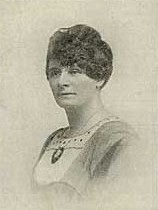Make your own notes on DORA by reading this website page.
The Changing Role of Women
Read and make notes from this website page.
The Suffragette movement was another organisation which split over the war. Emmeline Pankhurst,the leader of the militant Suffragette WSPU called off any further action. However, her own daughter Christabel disagreed and campaigned against the war. The Scottish Suffragette and socialist Helen Crawfurd also left the WSPU because she opposed the war.

Helen Crawfurd, Glasgow suffragette and socialist
The Glasgow Rent Strikes
Helen Crawfurd was one of the leaders of the Glasgow Rent Strikes. These were protests at the increase in housing rents in Glasgow during the war. Poor quality housing was already a major problem in Glasgow. The boom in war related industries brought extra workers into Clydeside and increased the demand for housing. Landlords were accused of taking advantage of this situation to line their own pockets by charging higher rents. Families which could not afford the higher rents wee threatened with eviction. Women were particularly important in the campaign because often their husbands and partners were away fighting.
Source 1: A demonstration in Glasgow

Source 2: A poster displayed in windows of homes of families threatened with eviction.

The sources show how well organised the Rent Strikes were. As well as demonstrations like the one above, families threatened with eviction were protected by the posters placed in the windows. Any agents ("bailliffs" or "sheriff's officers") employed by landlords to throw a family out of their home would be faced with an angry mob determined to stop them. A famous cry was ...
"God help the bailliff who comes into this close!"
Tactics like these put a stop to the evictions.
Eventually the government was forced to step in and control rents by law. A major victory had been won by direct action. Some historians argue that the Labour Party and the ILP which helped to organise these protests also benefited from these actions and, after the war, increased their vote at the expense of the Liberals who were often identified with the landlords.